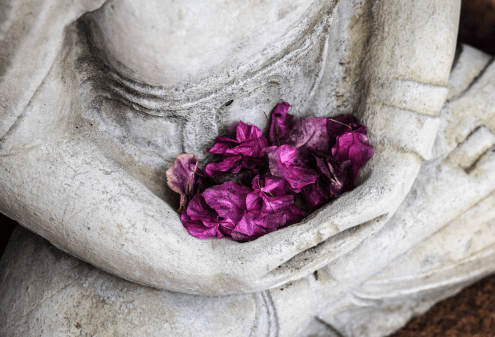
Retreat is a time when people can come to the monastery and meditate in a focused environment. This allows the possibility of directly experiencing the Buddha’s teachings. Every retreat is different, ranging in length from two to nine days. Most retreats at the Jetvan Monastery have a theme. Almost all retreats are held in silence. Usually a good portion of the day is spent in silent meditation. Retreatants are required to follow the eight monastery precepts, including not eating after noon. Everyone is expected to participate in the retreat schedule.
All these aspects allow for an environment in which meditation practice and mindfulness can be the priority. Bhante Gunaratana discusses the effects of this kind of practice in his article, The Benifits of Long Term Meditation. Retreats help develop a stronger, richer meditation.
If you’ve never been to a retreat at Jetvan Monastery before, the silence, meal schedule, and rules of the monastery may seem a bit daunting. What we’ve found, though, is that most people quickly adjust and have a good retreat experience. Retreats are a good place to deepen your practice because you have the support of other practitioners, teachers, and a retreat structure around you. The environment is designed to make it easy to relax and meditate without distraction.
Typically, a retreat will include six to eight hours of scheduled meditation time each day. All retreatants are allowed to divide up the meditation period between sitting, walking and standing meditation in a way that works best for them. Depending on the type of retreat, there will be one or more daily Dhamma talks. Also, some retreats include interviews with teachers and group discussions on the retreat theme.
The rule of not eating after noon is a monastic rule that goes back to the time of the Buddha and is observed most commonly by Theravada monks and nuns. We find that because a meditation retreat isn’t physically rigorous, most people can get by with two high-quality meals a day. Not eating late in the day tends to make people less drowsy. It also frees up more time for practice. If you have a medical reason for eating after midday, we can make an exception for you. Please note this need when you complete your Visit Registration.
Silence and the monastery precepts free up the mind in the same way that fasting in the afternoon frees up the stomach. Without the distraction of relating to others, your attention can more easily be focused inward. At the end of most retreats, the silence is broken after the last lunch. Many participants stick around to talk to their fellow retreatants.
Because Jetvan Monastery retreats are run entirely by volunteer staff and residents, retreatants are each given a small daily work assignment. This is usually something simple like vacuuming a room or helping with the dishes. This mindfulness at work task is also helpful for integrating mindfulness with simple activity.
Jetvan Monastery has both kutis, monastic style cabins, and dorm-style residences. Housing is strictly separated by gender. The seating in the meditation hall is also separated by gender. Like much of the retreat structure, this supports undistracted and meaningful focus on meditation practice throughout the retreat.
